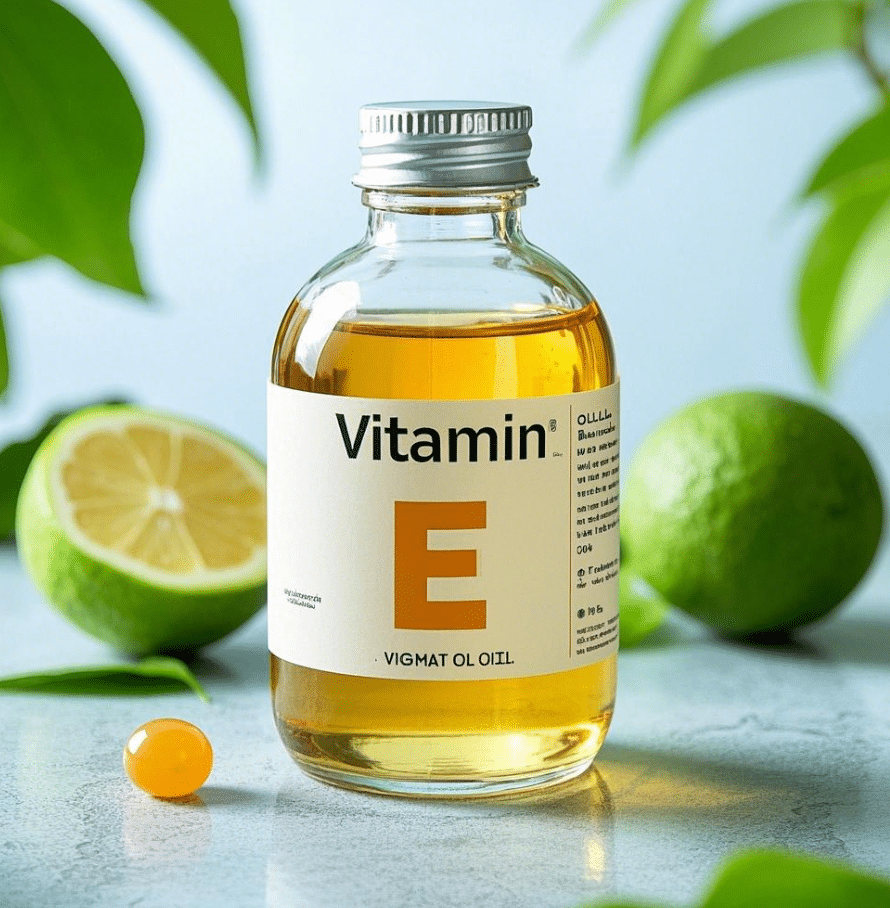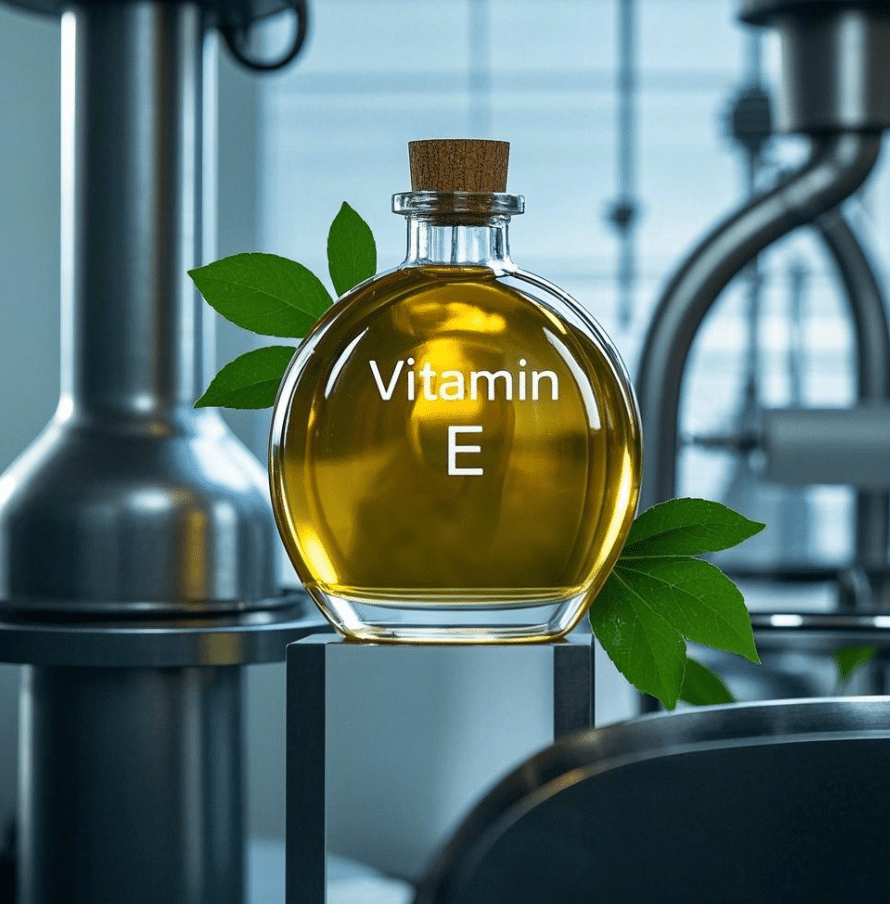The Ultimate Guide to Organic Vitamin E Oil: Nature’s Skincare and Health Powerhouse
What is Organic Vitamin E Oil? Hey there, health enthusiasts and beauty buffs! 👋 Ready to dive into the wonderful world of organic vitamin E oil? Buckle up, because we’re about to take you on a wild ride through the land of antioxidants and nourishment. Whether you’re a brand owner, ingredient supplier, or just someone who’s curious about this golden elixir, this guide’s got you covered. Let’s get this glow party started! ✨
What’s the 411 on Organic Vitamin E Oil?
Alright, let’s start with the basics. Organic vitamin E oil is basically the coolest kid on the block when it comes to natural skincare and health supplements. But what exactly is it?
- Aliases: Tocopherol, Nature’s Youth Serum
- Latin Name: Tocopherolum
- CAS Number: 59-02-9 (for α-tocopherol)
- Production Standard: USDA Organic, NOP
- Appearance: Clear to pale yellow oil
- Taste: Generally tasteless (but please don’t drink it!)
- Solvents Used: Typically organic vegetable oils for extraction
- Common Specifications: 1000 IU/g, 1500 IU/g
- Import Tariffs: Varies by country (0-5% in the US, 0-6.5% in the EU)
- HS Code: 2936.28
- Shelf Life: Generally 24-36 months when stored properly
- Storage: Cool, dry place away from direct sunlight
- Packaging: Usually in 1kg, 5kg, or 25kg amber glass bottles or HDPE drums
The Birth of a Star: Vitamin E’s Origin Story
Vitamin E was first discovered in 1922 by Herbert Evans and Katherine Bishop at the University of California, Berkeley. But it wasn’t until the 1950s that researchers really started to get the lowdown on this crucial nutrient. The OG vitamin E oil was born out of a need for natural antioxidants and skin nourishment. Talk about a glow-up! 💪
Vitamin E Oil: Shapeshifter Extraordinaire
This versatile little nutrient comes in a few different forms:
- Oil (obvs)
- Capsules (for those who like their vitamins bite-sized)
- Creams and lotions (hello, vitamin a and e face cream!)
- Liquid vitamin E (for easy mixing and blending)
Each has its own swagger, but today we’re all about that organic oil life.
The Secret Sauce: What’s in Organic Vitamin E Oil?
Organic vitamin E oil isn’t just pure vitamin E (wouldn’t that be too easy?). It’s usually mixed with some helpful sidekicks:
- Organic carrier oils (like sunflower or olive oil)
- Sometimes mixed tocopherols for enhanced stability
- Organic essential oils (in some formulations for extra oomph)
Water and Oil: A Love-Hate Relationship
Here’s the tea: organic vitamin E oil isn’t water-soluble. It’s like that friend who refuses to jump in the pool at parties. But don’t freak out! This oil-soluble nature is what makes it so great for your skin and hair. It’s like a VIP pass to moisture town. 💦
Where’s the Party At? Organic Vitamin E Oil’s Hangout Spots
This golden goodness is popping up everywhere:
- Skincare products (hello, vitamin e moisturizer!)
- Hair care formulations (hair oil vitamin e, anyone?)
- Dietary supplements
- Pet care products (yep, there’s vitamin e oil for dogs!)
- Natural cosmetics (vitamin e lip balm, we’re looking at you!)
How It’s Made: The Organic Vitamin E Oil Production Saga
Without getting too nerdy, here’s the basic rundown:
- Start with organic, non-GMO soybeans or sunflower seeds
- Cold-press to extract the oil
- Refine and concentrate to isolate vitamin E
- Blend with organic carrier oils
- Quality testing (because we’re fancy like that)
It’s like a scientific Cinderella story, from seed to bottle!
The Superhero Powers of Organic Vitamin E Oil
Alright, let’s talk about why this stuff is basically the Avengers of the natural health world:
- Powerful antioxidant protection (bye-bye, free radicals!)
- Skin nourishment and hydration (hello, glow!)
- Supports healthy hair and nails
- May help with skin conditions like keratosis (vitamin e for keratosis, anyone?)
- Potential benefits for heart health when consumed orally
The Dark Side: Potential Side Effects
Even superheroes have their kryptonite. While organic vitamin E oil is generally safe, too much of a good thing can lead to:
- Potential increased bleeding risk (if consumed in high doses)
- Skin irritation in some people (always patch test!)
- Interference with certain medications
But don’t panic! These are usually only an issue if you’re going way overboard.
How Organic Vitamin E Oil Works Its Magic
Picture this: Organic vitamin E oil is like a bodyguard for your cells. It patrols your skin and body, neutralizing free radicals (those pesky troublemakers that cause aging and damage). It also helps strengthen cell membranes, keeping your skin plump and happy. And let’s not forget its moisturizing superpowers – it’s like a tall drink of water for your skin!
Organic Vitamin E Oil: Under the Microscope
When it comes to testing organic vitamin E oil, scientists don’t mess around. They use fancy techniques like:
- High-Performance Liquid Chromatography (HPLC)
- Gas Chromatography-Mass Spectrometry (GC-MS)
- Spectrophotometry
It’s like CSI, but for vitamins!
Mix and Match: Popular Organic Vitamin E Oil Formulations
Organic vitamin E oil loves to mingle. You’ll often find it hanging out with:
- Vitamin C (they’re BFFs in the antioxidant world)
- Hyaluronic acid (for that extra moisture boost)
- Jojoba oil (in hair and skin care blends)
- Cocoa butter (hello, palmers cocoa butter vitamin e oil!)
Dosage Dilemma: How Much is Just Right?
The magic number varies, but generally:
- For skin application: A few drops applied directly or mixed into your favorite moisturizer
- For hair: A few drops massaged into the scalp or added to your shampoo
- For oral supplements: 15 mg per day for adults (but always check with a healthcare pro!)
Patience is a Virtue: When Will You See Results?
Rome wasn’t built in a day, and neither is perfect skin. It usually takes a few weeks to a couple of months to see the full effects of organic vitamin E oil. Stick with it, and your skin will thank you!
The Science Behind the Magic
Organic vitamin E oil is like the conductor of your body’s antioxidant orchestra. It helps protect cell membranes, supports collagen production, and even plays a role in immune function. It’s not just about glowing skin – it’s about overall body harmony.
Vitamin E’s Squad: Similar Supplements
While organic vitamin E oil is a superstar, it’s not the only player in the game. Other supplements that might be in the same league include:
Breaking News: Latest Clinical Research
Scientists are working overtime to uncover new benefits of vitamin E. Recent studies have looked at its potential role in:
- Alzheimer’s disease prevention
- Cancer treatment support
- Cardiovascular health
- Non-alcoholic fatty liver disease management
Stay tuned for more exciting developments!
Around the World in Vitamin E Regulations
Buckle up for a whirlwind tour of organic vitamin E oil regulations:
- USA: Regulated as a dietary supplement by the FDA, with organic certification from USDA
- EU: Considered a food supplement, with specific health claims allowed
- Japan: Recognized as a Food for Specified Health Uses (FOSHU)
- Australia/New Zealand: Regulated as a complementary medicine
- Canada: Natural Health Product, regulated by Health Canada
Always check local regulations before launching your vitamin E product!
Market Madness: Organic Vitamin E Oil by the Numbers
The organic vitamin E oil market is booming, baby! 💰
- Global market size: Approximately $700 million in 2020
- Projected CAGR: 5.8% from 2021 to 2028
- Regional hotspots: North America and Europe leading the charge
- Fastest-growing markets: Asia-Pacific and Latin America
FAQs: What’s on Everyone’s Mind?
Are Organic Vitamin E Oil products more moisturizing than Glycolic Acid or Vitamin C serums?
Organic Vitamin E Oil is indeed more moisturizing. It’s an oil-soluble antioxidant that can deeply penetrate the skin, providing intense hydration. Glycolic Acid and Vitamin C, while beneficial for skin health, are not primarily moisturizing agents.
Are Vitamin C serums more effective at brightening skin than Organic Vitamin E Oil?
Yes, Vitamin C is generally more effective at brightening skin tone and fading dark spots. While Vitamin E can help improve overall skin health, it doesn’t have the same targeted brightening effects as Vitamin C.
Are Glycolic Acid treatments more likely to cause skin sensitivity than Organic Vitamin E Oil?
Glycolic Acid is more likely to cause skin sensitivity, especially when first introduced to a skincare routine. Organic Vitamin E Oil is generally well-tolerated and can actually help soothe sensitive skin.
Are Organic Vitamin E Oil products more stable and less prone to oxidation than Vitamin C serums?
Organic Vitamin E Oil is indeed more stable than many Vitamin C formulations. While Vitamin E can oxidize over time, it’s generally more stable than Vitamin C, which is notoriously prone to oxidation.
Are Vitamin E Oil treatments more commonly used for scar healing than Glycolic Acid or Vitamin C?
Vitamin E Oil is often used for scar healing and is a popular home remedy for this purpose. However, scientific evidence supporting its effectiveness for scar treatment is mixed. Vitamin C can also aid in wound healing and collagen production.
Are Organic Vitamin E Oil products more effective for protecting against free radical damage than Glycolic Acid?
Yes, Organic Vitamin E Oil is more effective at protecting against free radical damage. It’s a potent antioxidant, while Glycolic Acid’s primary function is exfoliation rather than antioxidant protection.
Are Glycolic Acid treatments more effective for treating acne than Organic Vitamin E Oil?
Glycolic Acid is generally more effective for treating acne due to its exfoliating properties and ability to unclog pores. While Vitamin E can help with overall skin health, it’s not typically used as a primary acne treatment.
Are Vitamin C and Organic Vitamin E Oil more commonly combined in anti-aging products than with Glycolic Acid?
Vitamin C and Vitamin E are often combined in anti-aging products due to their synergistic antioxidant effects. While Glycolic Acid is also used in anti-aging formulations, it’s less commonly combined directly with these vitamins.
Are Organic Vitamin E Oil products less likely to increase sun sensitivity compared to Glycolic Acid or Vitamin C?
Organic Vitamin E Oil doesn’t increase sun sensitivity and may offer some protection against UV damage. In contrast, Glycolic Acid can increase sun sensitivity, while Vitamin C can actually enhance UV protection when used with sunscreen.
Are Vitamin E concentrations in skincare products typically lower than those of Vitamin C or Glycolic Acid?
Vitamin E is often used in lower concentrations compared to Vitamin C or Glycolic Acid. Typical Vitamin E concentrations range from 0.5-1%, while Vitamin C can be 10-20% and Glycolic Acid 5-30%.
Are Organic Vitamin E Oil treatments more effective for improving skin elasticity than Glycolic Acid or Vitamin C?
While Vitamin E can contribute to skin health and potentially improve elasticity, both Vitamin C and Glycolic Acid are generally considered more effective for this purpose. Vitamin C directly supports collagen production, while Glycolic Acid stimulates cell turnover, both of which can improve skin elasticity.
The Good, The Bad, and The Vitamin E
Pros:
- Powerful antioxidant properties
- Versatile for skin, hair, and health applications
- Natural and organic option for health-conscious consumers
- Long shelf life when stored properly
- Can be easily incorporated into various formulations
Cons:
- Can be expensive compared to synthetic versions
- May cause allergic reactions in some individuals
- Oil texture may not be suitable for all skin types
- Potential for oxidation if not stored properly
- Limited water solubility can make formulation challenging
Supplier Savvy: Choosing Your Organic Vitamin E Oil Wingman
When picking an organic vitamin E oil supplier, keep these tips in mind:
- Check for proper organic certifications (USDA, EU Organic, etc.)
- Ask for third-party test results and CoAs
- Inquire about their sourcing and production methods
- Look for suppliers with a good track record in the organic industry
- Don’t be afraid to request samples for testing
The Journey from Seed to Bottle: Organic Vitamin E Oil Production Flow
- Organic seed selection (soybean or sunflower)
- Cold-pressing to extract oil
- Refining and concentration of vitamin E
- Blending with organic carrier oils
- Quality control testing
- Packaging in light-resistant containers
- Final product testing and certification
And there you have it, folks! Your crash course in all things organic vitamin E oil. Whether you’re looking to launch the next big thing in natural skincare or just curious about the benefits of vitamin e for beard growth, we hope this guide has shed some light on this golden elixir of youth.
Remember, if you’re in the market for top-notch organic vitamin E oil or any other natural ingredients, hit up the cool cats at Gensei Global Industries. Drop them a line at sales@collagensei.com for all your vitamin E needs. They’ve got the certifications, the quality, and the know-how to get you sorted. Plus, with their OEM and ODM services, they can help you take your product from dream to reality faster than you can say “organic vitamin E oil”!
Stay glowy, stay healthy, and keep spreading those good vibes! ☀️💪







